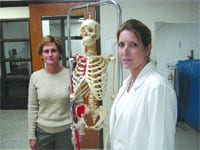Sound Results – What’s the Connection Between Hearing and Cognitive Health?
Hearing loss occurs in approximately one in three people age 65 to 74 and nearly one in two people age 75 and older in the U.S., making it one of the most common conditions affecting older adults. Last year, the National Academies of Sciences, Engineering, and Medicine released “Hearing Health Care for Adults: Priorities for Improving Access and Affordability” a report that highlights the importance of hearing health to communication and overall quality of life, and proposes recommendations to increase the availability and affordability of hearing healthcare.
Research funded by the National Institute on Aging (NIA) has indicated that hearing loss may impact cognition and dementia risk in older adults. A 2011 study found that older adults with hearing loss were more likely to develop dementia than older adults with normal hearing. In fact, there was a relationship between the level of uncorrected hearing loss and level of dementia risk: mild hearing loss was associated with a two-fold increase in risk, moderate hearing loss with a three-fold increase in risk, and severe hearing loss with a five-fold increase in risk.
Furthermore, a more recent study found that cognitive abilities (including memory and concentration) declined faster in older adults with hearing loss, as compared to older adults with normal hearing. These observations by scientists raise the question: can cognitive decline and/or dementia onset be slowed or stopped by correcting hearing loss?
The NIA has recently funded the Aging, Cognition, and Hearing Evaluation in Elders (ACHIEVE) clinical trial led by Drs. Frank Lin and Josef Coresh at Johns Hopkins University to examine the potential benefits of hearing rehabilitation. ACHIEVE will recruit 850 cognitively normal adults aged 70-84 with hearing loss from four locations (Hagerstown, Md., Jackson Miss., Minneapolis, Minn., and Winston-Salem, N.C.). Individuals will be randomly assigned to either the hearing intervention (hearing needs assessment, fitting of hearing devices, education/counseling) or control intervention (health education).
ACHIEVE participants will be followed for three years, and information on hearing function, cognition, and demographics (e.g. age, sex, and education level) will be collected at several times. The primary outcome of the study will be to determine if the hearing rehabilitative intervention changes the rates of cognitive decline as compared to the group receiving health education. Additionally, the researchers will examine if the intervention impacts physical and social functioning, quality of life, and physical activity.
This trial should further the healthcare industry’s knowledge on the relationship between age-related hearing loss and cognition and dementia. For further information on the trial, visit www.achievestudy.org.



Comments are closed.